A melodic homecoming: New Zealand musician traces roots in Guangdong
Writer: Zhang Yu | Editor: Zhang Zhiqing | From: Original | Updated: 2024-12-12
The soulful sounds of a saxophone and flute echoed through the tranquil Meichen Village in Taishan City, Guangdong Province, on Nov. 27, as Nathan Haines, a renowned musician from New Zealand, returned to the ancestral home of his grandfather.
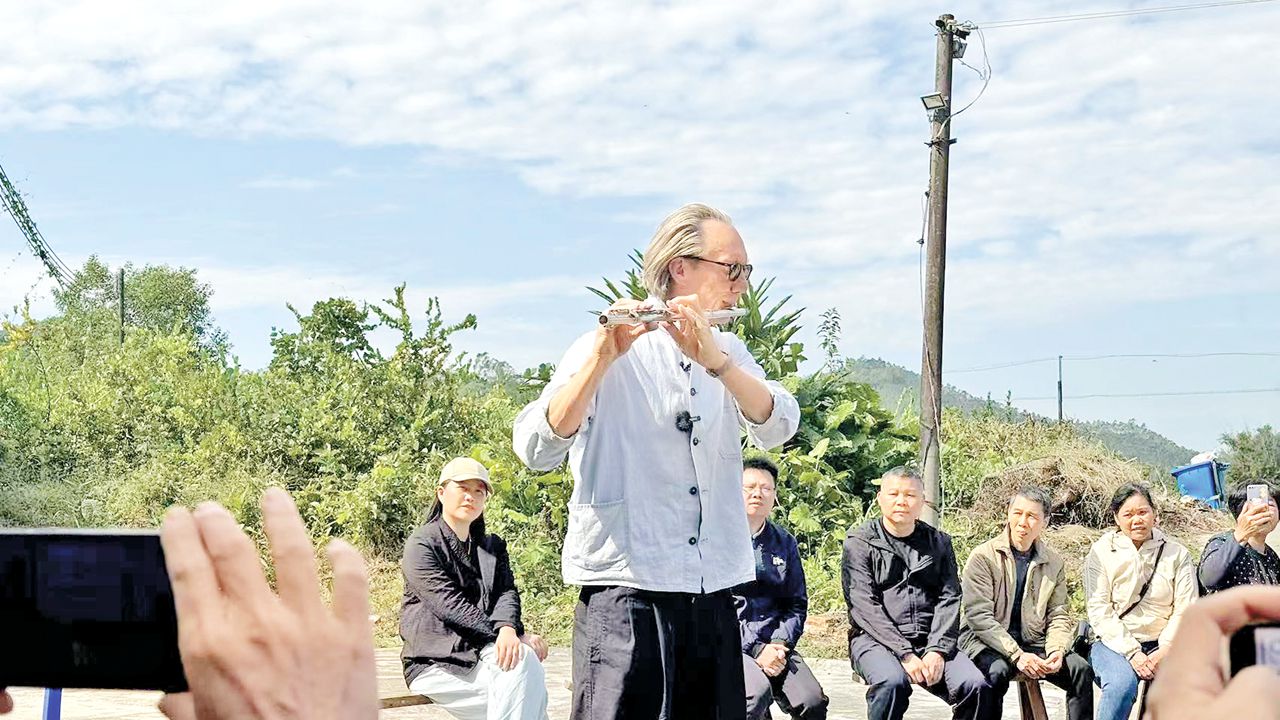
Nathan Haines plays the flute in front of villagers and his relatives at his ancestral home in Meichen Village, Taishan City, Guangdong Province, on Nov. 27. Photos courtesy of Jiangmen Daily except otherwise stated
This was no ordinary visit — it was a symphony of emotions, a harmonious fusion of past and present, and a reminder of the enduring ties that bind us to our ancestors.
Haines, an internationally acclaimed saxophonist and producer, has spent over 30 years blending jazz and dance music across multiple albums and collaborations.
The eldest son of jazz bassist Kevin Haines, Haines grew up immersed in music on Auckland’s North Shore in New Zealand. By the mid 1980s, he was performing at major international Jazz festivals in New Zealand with his father and guitarist brother, Joel.
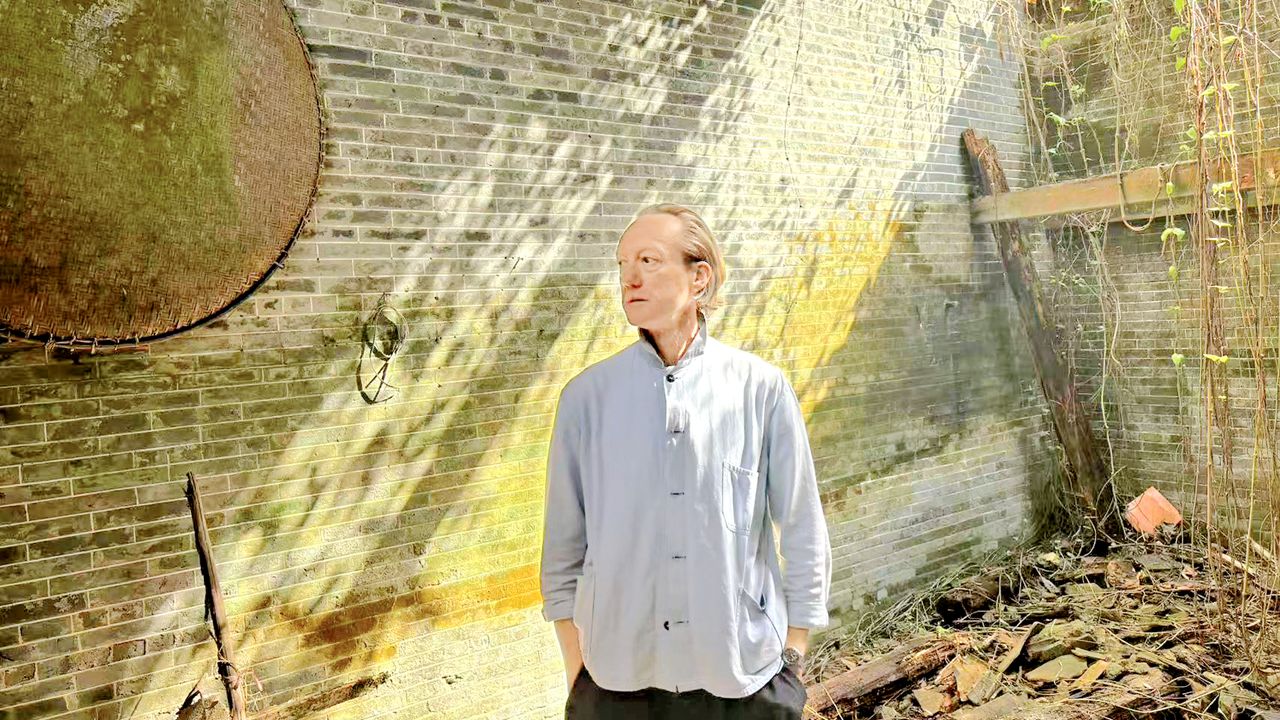
Nathan Haines spends time in his grandfather's house in Meichen Village, Taishan City, Guangdong Province, on Nov. 27. Courtesy of the Consulate General of New Zealand in Guangzhou
In late November, Haines visited Guangdong for a joint music composition and recording project with Shenzhen-based guqin virtuoso Shen Piji. Beyond this artistic venture, Haines' journey to Guangdong held a deeper significance — it was a quest to trace his roots to Taishan, the ancestral home of his maternal grandfather, Yu Changqiang.
Rediscovering roots in Taishan
“It was an amazing experience to walk into my grandfather’s house. I saw that they had cleaned it and done all the things. They’re very friendly, and I looked forward to talking with some of them,” said Haines upon returning to his grandfather’s old residence, which had been cleaned by his relatives in the village.
The seeds of this homecoming were sown last year when the Overseas Chinese Historical and Cultural Association of Taishan offered to help Haines trace his roots. With the assistance of various parties, including the Consulate General of New Zealand in Guangzhou, Haines' search culminated in a heartwarming reunion with his relatives in Meichen Village on Nov. 27.

Nathan Haines is seen during a traditional ancestral worship ceremony at his grandfather’s house in Meichen Village.
In addition to exploring the dwelling where his grandfather once resided, Haines also engaged in traditional ancestral worship ceremonies within the ancestral hall and house. He also exchanged family narratives with local kin.
In appreciation of the warm reception he received from the villagers, he crafted an impromptu musical tribute on-site, using the universal language of music to convey his profound love for his ancestral homeland.
According to Haines, his family’s migration story began with his great-great-grandfather, who journeyed to New Zealand in the late 1800s, lured by the gold rush. This move eventually paved the way for his son — Haines' great-grandfather — to join him in New Zealand. Born in Taishan in 1915, Haines' grandfather emigrated to New Zealand with his father at the tender age of 9.
After completing his studies in New Zealand, Haines’ grandfather returned to China, where he started a family before once again journeying to New Zealand. There, he established another branch of the family tree, from which Haines' mother descended. However, Haines' grandfather still had family members living in Taishan.
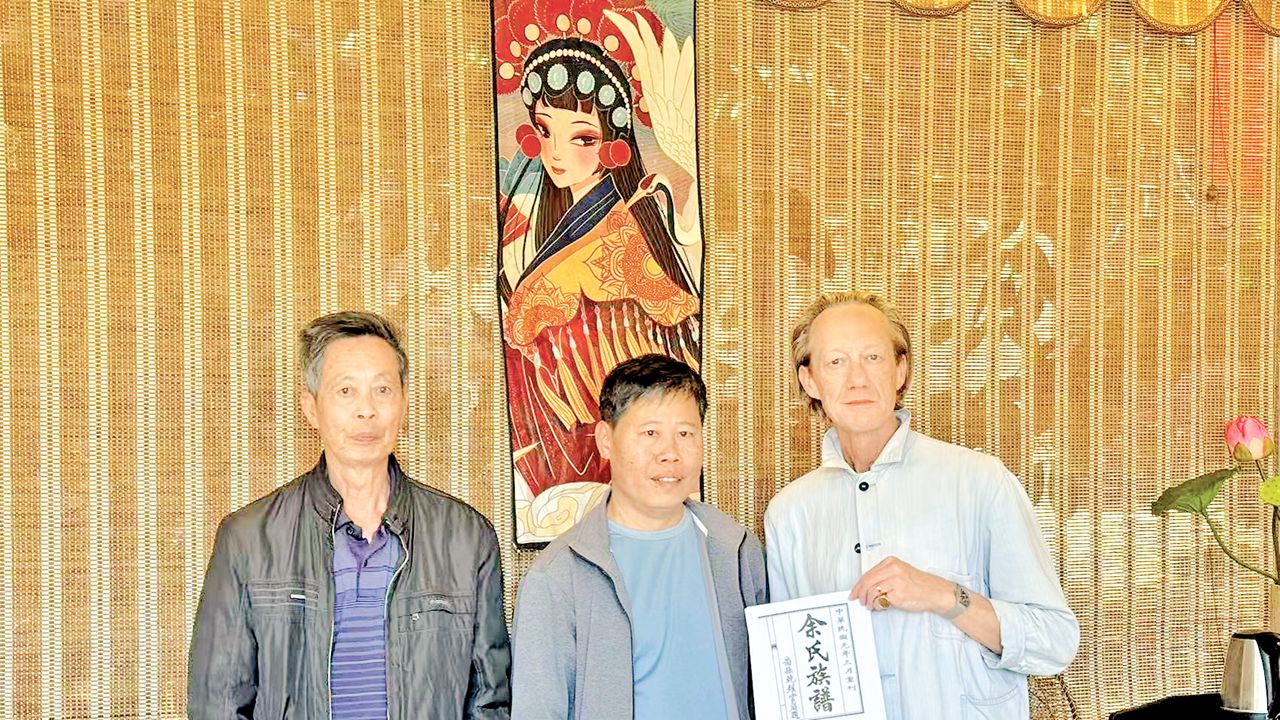
Nathan Haines, holding a family tree book, poses for a photo with Meichen Village's chief (L) and Party secretary (C).
“This last year for me has been about retracing my Chinese roots,” said Haines during an exclusive interview with Shenzhen Daily. He added that the quest reached its culmination when he visited his ancestral village, which he described as “an amazing experience.”
“I feel very connected as a human being to China and to the people of China,” he noted.
Haines found it remarkable how the Chinese, who began their migration centuries ago, spread across the globe while maintaining strong ties to their homeland, often by sending money back home. The contributions of overseas Chinese were significant in many countries, such as building railroads in the U.S. and developing urban infrastructure in others. In places like New Zealand, their influence extended beyond just the Chinese community.
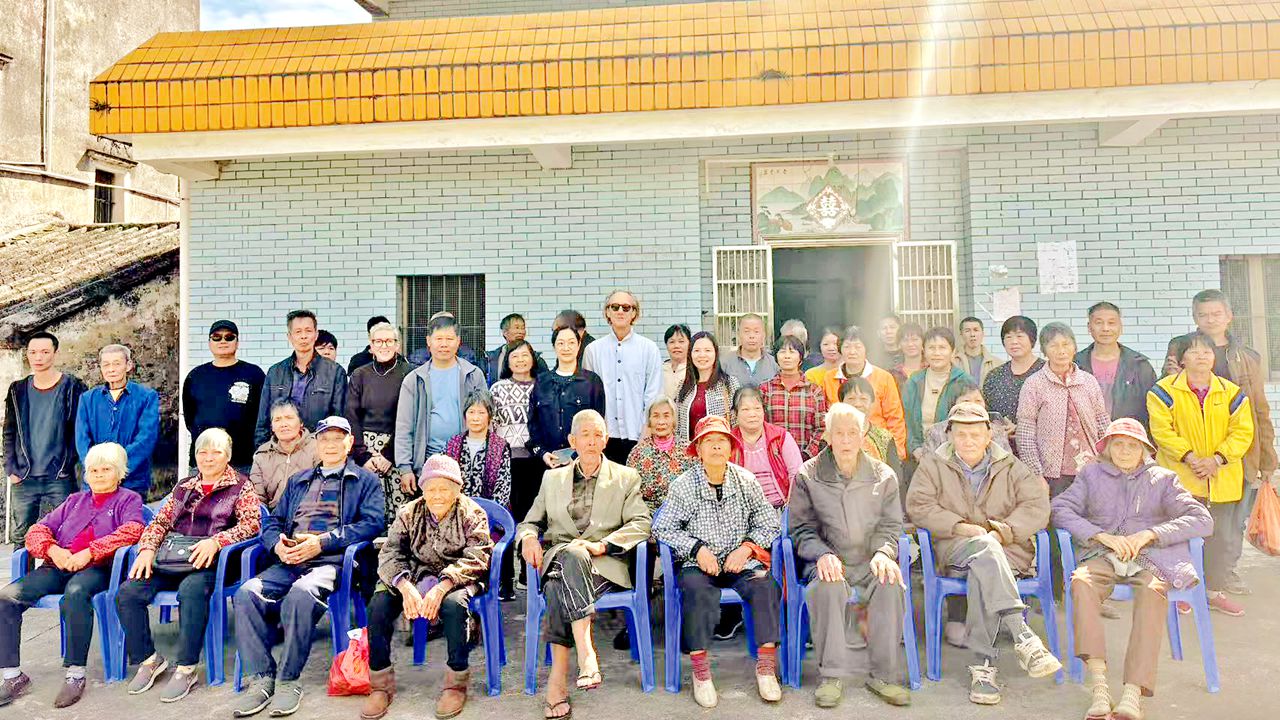
Nathan Haines poses for a group photo with his relatives, villagers, and officials at Meichen Village in Guangdong's Taishan on Nov. 27. Courtesy of the Consulate General of New Zealand in Guangzhou
His grandfather, for example, worked as a market gardener before becoming a chef, and his family once operated a Chinese laundry. “As a descendant of these trailblazers, I want to translate my findings into art and collaborate with Shen [Piji] to highlight the stories of Chinese [people] and the influence Chinese people have had on cultural exchange and communication,” he told Shenzhen Daily.
Haines' story of tracing his roots in Taishan will be filmed as a documentary with funding from New Zealand’s Chinese Poll Tax Heritage Trust to showcase the deep connection overseas Chinese people have with their ancestral hometowns.
Musical fusion between East and West
Haines' talent was nurtured from a young age. He left to study in New York in 1991, which immersed him in the worlds of jazz, hip-hop, and Latin music. These genres became highly influential to the bands he later formed and the records he would make.
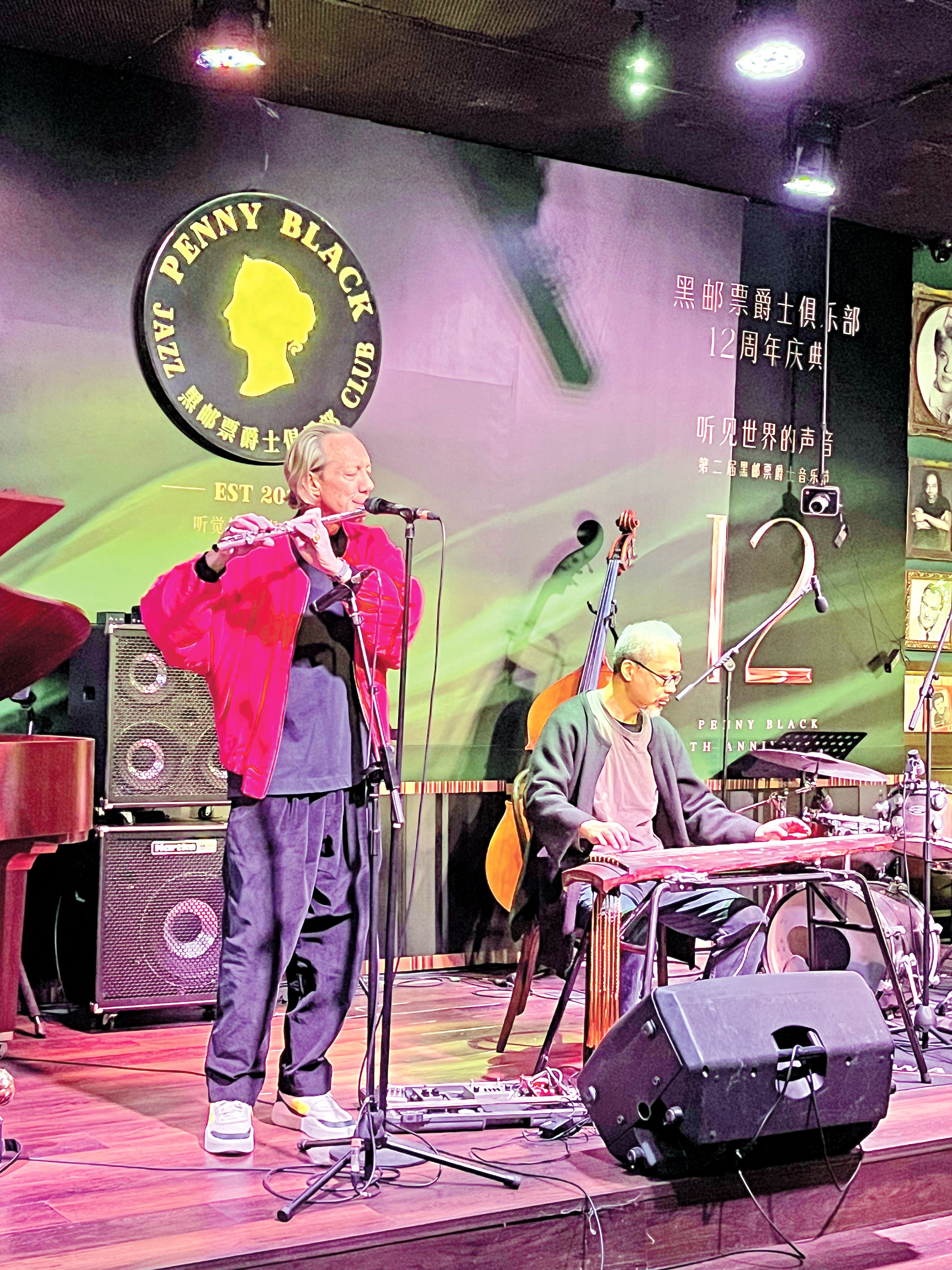
Nathan Haines (L) and Shenzhen-based guqin artist Shen Piji perform during a networking event hosted by the Consulate General of New Zealand in Guangzhou at the Penny Black Jazz Club in Nanshan District. Zhang Yu
In New Zealand, he has been awarded two gold records and won multiple awards for Best Jazz Album. He is also an internationally recognized musician, and many of his albums have become classics.
In October 2023, at the invitation of the 22nd China Shanghai International Arts Festival, he staged a performance in Jinshan District, Shanghai. In the same month, invited by the Xinghai Conservatory of Music in Guangzhou, he presented a master class to students and gave a concert at the conservatory.
At the end of this November, apart from tracing his Chinese roots in Guangdong, Haines came to Shenzhen and collaborated with a guqin artist to compose and record music.
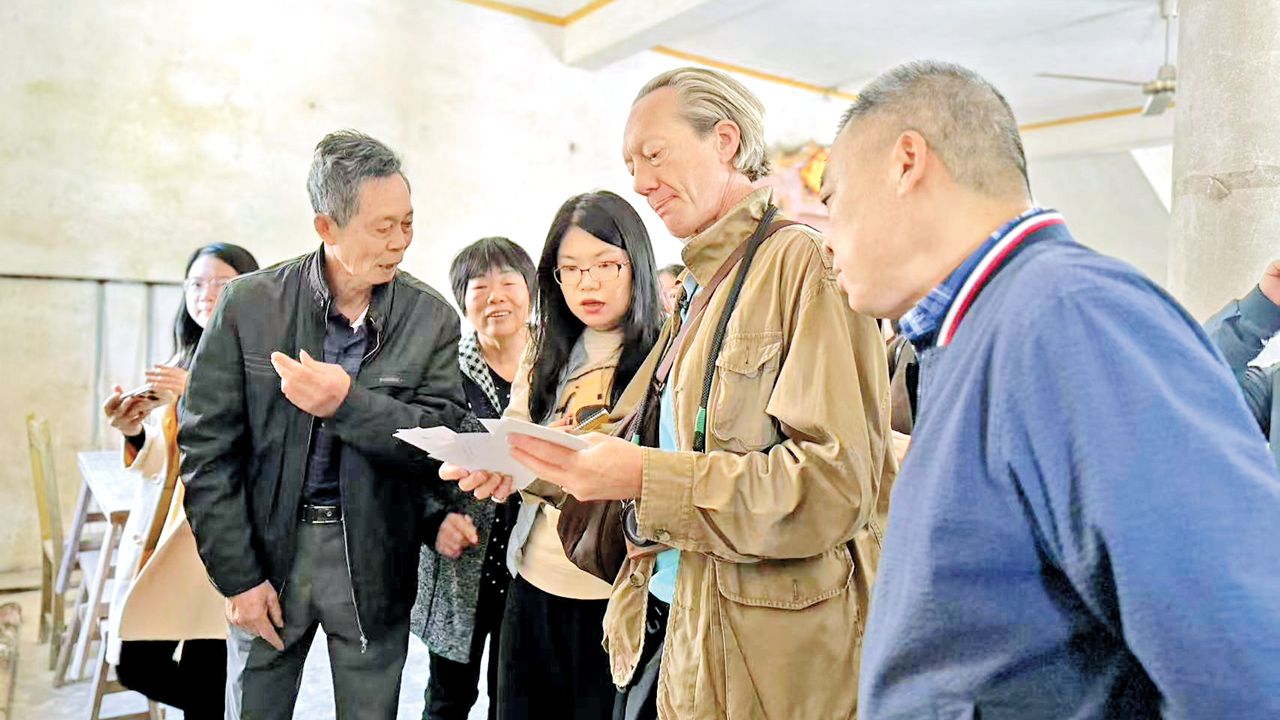
Nathan Haines shows family photos to Meichen villagers.
On Nov. 30, Haines teamed up with Shenzhen-based guqin artist Shen for an impromptu performance at a networking event hosted by the Consulate General of New Zealand in Guangzhou, which was held at the Penny Black Jazz Club in Nanshan District.
“I met Shen last year, so I’ve come back to work with him. He doesn’t speak English, and I don’t speak Chinese. We can just communicate magically because music is universal. He’s an amazing musician, and I think we just sort of fit together,” Haines shared.
“The last two days I’ve been recording with Shen, and the music that we recorded will be the backbone of the soundtrack that I’m writing for the documentary,” he added.
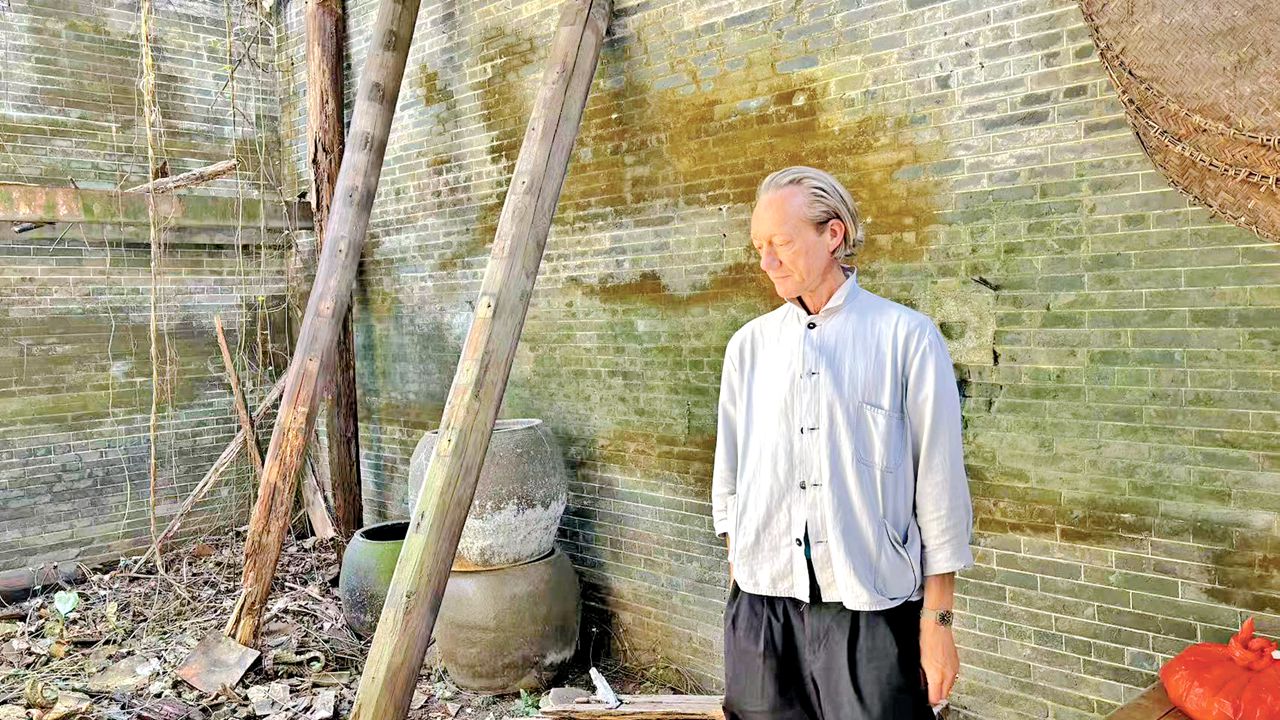
Nathan Haines spends time in his grandfather's house in Meichen Village, Taishan City, Guangdong Province, on Nov. 27. Courtesy of the Consulate General of New Zealand in Guangzhou
“He is a very good recording engineer. He brought his own microphone, and we had some collaboration with good equipment,” Shen said.
According to Shen, merging the delicate notes of the guqin with the vibrant rhythms of jazz is no simple task. “The guqin is an inherently introspective instrument, one that primarily engages in a dialogue with nature. However, I believe he possesses an Eastern lineage, while I hold an appreciation for Western music. This unique blend of cultural perspectives is where our creative collision occurs.”
Talking about the possible influence of this trip on his music, Haines shared that everything in his life finds its way into his music. “This experience has been really amazing for me recently, and I hope to come back to China every year,” he said. “I think this is just a start. I want to learn more about China, the Chinese heritage, and Chinese music.”